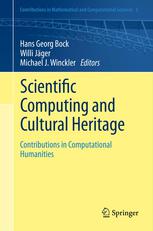

Most ebook files are in PDF format, so you can easily read them using various software such as Foxit Reader or directly on the Google Chrome browser.
Some ebook files are released by publishers in other formats such as .awz, .mobi, .epub, .fb2, etc. You may need to install specific software to read these formats on mobile/PC, such as Calibre.
Please read the tutorial at this link: https://ebookbell.com/faq
We offer FREE conversion to the popular formats you request; however, this may take some time. Therefore, right after payment, please email us, and we will try to provide the service as quickly as possible.
For some exceptional file formats or broken links (if any), please refrain from opening any disputes. Instead, email us first, and we will try to assist within a maximum of 6 hours.
EbookBell Team

5.0
18 reviewsThe sheer computing power of modern information technology is changing the face of research not just in science, technology and mathematics, but in humanities and cultural studies too. Recent decades have seen a major shift both in attitudes and deployment of computers, which are now vital and highly effective tools in disciplines where they were once viewed as elaborate typewriters. This revealing volume details the vast array of computing applications that researchers in the humanities now have recourse to, including the dissemination of scholarly information through virtual ‘co-laboratories’, data retrieval, and the modeling of complex processes that contribute to our natural and cultural heritage. One key area covered in this book is the versatility of computers in presenting images and graphics, which is transforming the analysis of data sets and archaeological reconstructions alike.
The papers published here are grouped into three broad categories that cover mathematical and computational methods, research developments in information systems, and a detailed portrayal of ongoing work on documenting, restoring and presenting cultural monuments including the temples in Pompeii and the Banteay Chhmar temples of the Angkorian period in present-day Cambodia. Originally presented at a research workshop in Heidelberg, Germany, they reflect the rapidly developing identity of computational humanities as an interdisciplinary field in its own right, as well as demonstrating the breadth of perspectives in this young and vibrant research area.